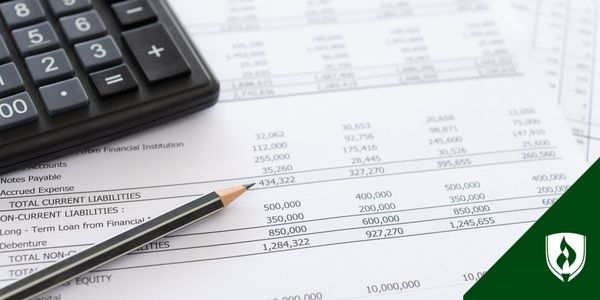
Picture this: it's the end of the fiscal year, and your accounting team is huddled around the conference tables stacked with a pile of financial documents. Senior leaders are waiting for updates on how the company performed this year, updates on where the risks are, wanting to know what strategies they should adopt next.
These are the moments when financial accountants are at the center of everything. The ability to interpret economic data, communicate results clearly, and prepare financial statements directly influences organizational decisions. This is why it is imperative to develop the right skills if you are looking to have a career as a financial accountant.
Let's walk through the essential skills every aspiring financial accountant should have. Whether you are a student pursuing an accounting degree, preparing for the CPA testing, or already an accountant for a publicly held company, these insights will help boost your accounting career and keep you competitive in the financial industry.1
The role of a financial accountant
Organizations of all sizes, from nonprofit organizations and public companies to small firms, and federal agencies need financial accounting. It is the backbone of financial operations.
Financial accountants are responsible for financial data, maintaining accurate financial records, preparing financial statements and ensuring compliance with accounting standards such as International Financial Reporting Standards® (IFRS®), an organization responsible for international accounting and sustainability disclosure standards, and generally accepted accounting principles (GAAP), the standard framework of guidelines for financial accounting in the United States.2
As a financial accountant, your role would involve:
- Reviewing financial records to ensure accuracy and ethical behavior.
- Preparing and analyzing balance sheets, income, cash flow and profit and loss statements.
- Managing risks by identifying trends for financial health.
- Supporting leadership teams in making informed decisions.
- Meeting compliance and business goals by collaborating with project managers and internal and external auditors.
Most accountants will tell you that succeeding in this profession requires a combination of technical expertise and soft skills that extend beyond routine accounting tasks. You will need to be proficient in tax compliance and financial compliance and understand generally accepted principles. You will also need critical thinking, effective communication and problem-solving abilities.
Here's a closer look at some of these skills.
Technical accounting skills you'll need in this career
Accounting skills are the foundation of every successful accounting career. Mastering technical and soft skills helps ensure accuracy, compliance and effective decision-making. At the core are technical skills.
Technical skills
As a financial accountant you must be able to understand accounting guidelines, interpret financial information accurately and prepare financial statements.
For example, imagine preparing a set of cash flow statements. These aren't just numbers on pages; these documents show whether the company can invest in growth, pay its bills, or if it needs to secure financing.
These technical skills include:
- Conducting data analysis to interpret trends in cash flow, generating reports, profit margins, and inventory turnover.
- Applying accounting principles like international financial reporting standards (IFRS) and generally accepted accounting principles (GAAP).
- Using financial reporting tools and accounting software to analyze and maintain accurate financial records.
Developing professional accounting skills through ongoing education, such as an accounting degree, is essential.
You can also expand your credentials and pursue the certified public accountant (CPA) designation. The CPA designation is beneficial for strengthening your technical skills and opening more opportunities for you in public and private accounting firms.
Essential soft skills you'll need in this career
Strong soft skills are equally important as technical skills. As an accountant, you will often juggle multiple projects, collaborate with accounting teams, and present complex financial information to leadership teams who rely on your insight for direction and decision-making.
Critical thinking and analytical skills
You may be wondering how these skills apply to accounting. Accountants work with more than numbers; they also solve problems. Critical thinking skills are used in forensic accounting. Financial crimes, such as embezzlement, require a forensic accountant or forensic auditor.
Financial information taken from misleading or incomplete records is pieced together, requiring problem-solving and the ability to think outside the box, beyond surface-level data.
Analytical skills help accountants interpret financial data and identify patterns that inform business decisions.
For example, cost accountants analyze inventory turnover rates. If the turnover is low, the cash is held up by products that aren't selling. A financial accountant with strong analytical skills can flag this issue, enabling the company leadership to develop strategies for improving profitability.
Communication skills
Although accounting is viewed as a numbers-driven profession, communication is a crucial skill. Financial accounts must explain the complex financial information in a way that non-accountants, such as state agencies, business owners, or decision-makers can understand.
For example, when an accountant is presenting financial statements to the company executive, he or she needs to be able to highlight what the numbers mean for business growth, not just recite the figures. This requires both the ability to tailor the discussion to different audiences and strong communication skills.
Other soft skills you should master:
- Time management skills to manage multiple tasks, projects and deadlines.
- Collaboration and teamwork with internal and external auditors and business leaders.
- Professional conduct when working with financial teams and clients.
These skills will make you a well-rounded accounting professional.
Organizational skills and attention to detail
Imagine filing tax reports for a public company. Somehow, the revenue was misreported by a few thousand dollars. A small error like that could trigger audits, penalties, and even accusations of fraud, making attention to detail vital.
Accountants typically manage multiple projects, such as tax preparation and preparing profit and loss statements. Accountants need to ensure the financial records are accurate. They also need to double-check calculations and verify financial documents.
Project management
Project management is an essential skill for a financial accountant. Project coordination requires planning, executing, and overseeing financial tasks and initiatives efficiently. Whether managing a closing monthly account, implementing new accounting software, or coordinating audits, project coordination ensures deadlines are met and resources are used effectively.
It involves setting clear objectives, creating detailed timelines, delegating responsibilities, and monitoring progress to identify and address potential issues before they escalate.
Adaptability and time management
There are periods when accountants face heavy workloads. This is often during quarterly reporting cycles and tax season. Time management is crucial to balance standard accounting practices with more complex analytical duties. For example, while handling tax preparation and tax accounting for multiple clients, a financial accountant may also need to complete internal audits, support external audits and provide insights into the company's overall economic health. To successfully juggle these responsibilities, an accountant will need efficient adaptability and time management skills.
The combination of technical, hard and soft skills forms the backbone of financial accounting and equips accountants to succeed across industries.
Real world scenarios where basic accounting skills matter
In forensic accounting
Forensic accountants are typically called when there is suspicion of fraud. They are called to investigate the suspected fraud within the firm by analyzing financial records, interpreting cash flow statements, and identifying any discrepancies that may reveal financial crimes.3
In a public company
A financial accountant working for a public company must ensure that all financial documents comply with IFRS® and GAAP®. The accounting team also ensures investors receive accurate financial information, influencing business decisions and stock prices.
Internal auditing in government agencies
Attention to detail and analytical practices are the skills that help internal auditors within federal agencies. They must review financial documents to ensure compliance with regulations. Their duties support maintaining transparency and trust in public financial operations.
Supporting business leaders
Most accountants today are responsible for standard accounting duties and providing insights that support and shape business strategy. For example, accountants help project managers and company leaders develop strategies to improve efficiency and growth by analyzing inventory cycle and profit margins.
Tax laws and regulatory compliance
Understanding what is required to comply with taxation laws is critical for accountants, both public accounting firms and privately held companies. Financial accountants often support tax accounting projects, prepare tax returns, and ensure that businesses follow government regulations.
Forensic auditors need a deep understanding of tax laws to detect fraud and investigate irregularities. Not to exclude other accounts, those working with public companies must comply with strict SEC reporting requirements under IFRS and GAAP.
Education and experience requirements for financial accountants
Now that we have some insight into the skills you will need to become a financial accountant, let's talk about where to begin with a career path. Experience and education provide the training necessary to handle the complexity of financial management, whether conducting data analysis, preparing income statements, or managing business risks.
To start the journey for a career in the world of numbers, most accountants begin by earning a bachelor's degree in finance or accounting. These degree programs can build the foundation in accounting principles, financial reporting and business operations.
Many accountants will continue their credentials and pursue certification as a CPA by passing the CPA exam. The CPA certification enhances career opportunities in federal or local agencies, accounting firms, and privately held companies. The career path as an accountant can also take the route of a specialized area, such as internal auditing or forensic accounting. These areas may require additional certifications.
Preparing for success as a financial accountant
The job market for financial accountants is competitive, but the demand is high and strong. Federal agencies, businesses and even nonprofits need accountants with professional conduct, accounting expertise and the ability to manage risks.
The essential skills you will need for a financial account role go far beyond crunching numbers. They include technical, analytical, organizational and communication skills. Mastering both hard and soft skills will help you stand out.
This means learning technical skills like preparing tax returns or financial statements, and honing efficient, practical soft skills like communication, coordination and problem-solving.
Pursuing certifications, continuing education, and gaining hands-on experience with financial management are all ways to enhance your accounting career. Whether you aim to specialize as a forensic auditor, join public accounting firms, or move into leadership roles, the right skills will keep you valuable and relevant.4
Accounting is more than numbers
Financial accounting is more than numbers; it's about telling the story of a company's financial health and helping senior leaders make decisions for a successful and sustainable future.
If that sounds like something you might like, check out 10 Accounting Pros and Cons to Consider—Before You Make it Your Major.
IFRS® is a registered trademark of International Financial Reporting Standards Foundation.
International Financial Reporting Standards® is a registered trademark of International Financial Reporting Standards Foundation.
1Rasmussen University’s Accounting Certificate, Accounting Associate’s degree, and Accounting Bachelor’s degree programs do not meet the educational requirements for licensure as a Certified Public Accountant (CPA) in any state. Each state determines its own requirements for licensure as a Certified Public Accountant (CPA). Please consult with your state’s board of accountancy or equivalent oversight agency for further details. These programs have not been approved by any state’s board of accountancy or other professional licensing agency.
2Additional/advanced education, specific certifications, and/or specific work experience may be required to work as a Financial Accountant. It is important to check with employers and/or boards and agencies in your state of residence regarding requirements
3Additional/advanced education, specific certifications, and/or specific work experience may be required to work as a Forensic Accountant. It is important to check with employers and/or boards and agencies in your state of residence regarding requirements
4Additional/advanced education, specific certifications, and/or specific work experience may be required to work as a Forensic Auditor. It is important to check with employers and/or boards and agencies in your state of residence regarding requirements.




